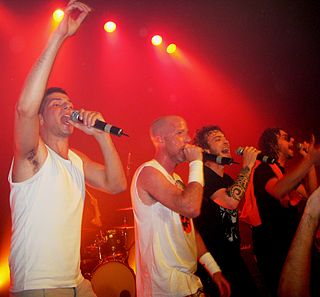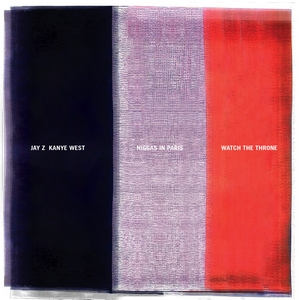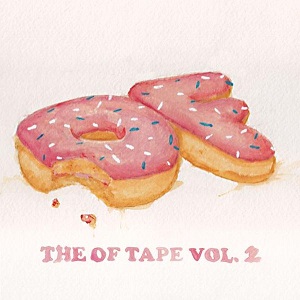Gangsta rap or gangster rap, initially called reality rap, is a subgenre of rap music that conveys the culture and values typical of urban gangs, reality of the world and street hustlers. Emerging in the late 1980s, gangsta rap's pioneers include Schoolly D of Philadelphia and Ice-T of Los Angeles, later expanding in California with artists such as N.W.A and Tupac Shakur. In 1992, via record producer and rapper Dr. Dre, rapper Snoop Dogg, and their G-funk sound, gangster rap broadened to mainstream popularity.

Michael Berrin, best known by his stage name MC Serch, is an American rapper and music executive. He gained fame as a member of the group 3rd Bass, which was active in the late 1980s and early 1990s. Serch has also worked as a solo artist and as a producer for other artists. In 1994, Serch executive produced Nas' debut album, Illmatic.

Nerdcore is a genre of hip hop music characterized by subject matter considered of interest to nerds and geeks. Self-described nerdcore musician MC Frontalot has the earliest known recorded use of the term in the 2000 song "Nerdcore Hiphop". Frontalot, like most nerdcore artists, self-publishes his work and has released much of it for free online. As a niche genre, nerdcore generally holds to the DIY ethic, and has a history of self-publishing and self-production.

Israeli hip hop refers to hip hop and rap music in Israel. Israeli hip hop artists have mainly emerged from the populations of Mizrahi Jews, Ethiopian Jews, and Israeli-Arabs, though there have also been numerous artists from Israeli Ashkenazi Jews especially Hasidim. Israeli hip hop artists enjoy wide popularity in Israel and have succeeded in appealing to international markets particularly the United States.
Comedy rock is rock music that is comedic in nature. It is often mixed with satire or irony.
Pop rap is a genre of music fusing the rhythm-based lyricism of hip-hop music with pop music's preference for melodious vocals and catchy tunes emphasizing on pop like productions and structure. The lyrics are often positive, with choruses similar to those heard in pop music. This genre gained mainstream popularity during the 1990s, though the influences and roots of pop rap can trace back to late-1980s hip-hop artists such as Run-DMC, LL Cool J, and Beastie Boys.

Comedy music or musical comedy is a genre of music that is comical, comedic or humorous in nature. Its history can be traced back to the first century in ancient Greece and Rome, moving forward in time to the Medieval Period, Classical and Romantic eras, and the 20th century. Various forms of comedic musical theatre, including "musical play", "musical comedy", "operetta" and "light opera", evolved from the comic operas first developed in late 17th-century Italy. Popular music artists in the 20th century interested in comedy include Allan Sherman, Frank Zappa, Tiny Tim, Barenaked Ladies, Randy Newman, and "Weird Al" Yankovic. Artists in the 21st century include Tenacious D, Flight of the Conchords, The Lonely Island, Ninja Sex Party and The Axis of Awesome.
LGBT representations in hip hop music have existed since the birth of the genre even while enduring blatant discrimination. Due to its adjacency to disco, the earliest days of hip hop had a close relation to LGBT subcultures, and multiple LGBT DJs have played a role in popularizing hip hop. Despite this early involvement, hip hop has long been portrayed as one of the least LGBT-friendly genres of music, with a significant body of the genre containing homophobic views and anti-gay lyrics, with mainstream artists such as Eminem and Tyler, the Creator having used casual homophobia in their lyrics, including usages of the word faggot. Attitudes towards homosexuality in hip hop culture have historically been negative, with slang that uses homosexuality as a punchline such as "sus", "no homo", and "pause" being heard in hip hop lyrics from some of the industry's biggest artists. Since the early 2000s there has been a flourishing community of LGBTQ+ hip hop artists, activists, and performers breaking barriers in the mainstream music industry.
Misogyny in rap music is defined as lyrics, videos, or other components of rap music that encourage, glorify, justify, or legitimize the objectification, exploitation, or victimization of women. It is an ideology that depicts women as objects for men to own, use, and abuse. It reduces women to expendable beings. It might include everything from innuendos to stereotypical characterizations and defamations.

Tyler Gregory Okonma, known professionally as Tyler, the Creator, is an American rapper, singer, record producer, and fashion designer. He has been cited as one of the most influential figures of pop culture of his generation, due to his unique, eclectic and colorful music and fashion styles, popularizing rap music as an "Internet phenomenon" that included a new wave of alternative hip hop and R&B artists during the 2010s.
Rucka Rucka Ali is an Israeli-American rapper, singer, radio personality, comedian, YouTuber, and parodist. He is best known for his dark humor, political and topical song parodies on YouTube. Much of his content pokes fun at ethnic, racial, and religious stereotypes. As of 2024, he has amassed 450+ million views and about 1.7 million subscribers on his music channel on YouTube. He has released eight independent studio albums, four of which have charted in the Billboard Top Comedy Albums.

"Yonkers" is a song written, produced, and performed by American rapper Tyler, the Creator, released digitally as the second single from his debut studio album Goblin on February 14, 2011. It received controversy due to its violent lyrics and numerous disses, although it was critically acclaimed and landed on numerous year-end lists. Tyler also directed a music video for the single, which was also met with positive critical reception and earned him the MTV Video Music Award for Best New Artist at the 2011 MTV Video Music Awards. Numerous magazine publications noted "Yonkers" as Tyler's breakout song.

"Niggas in Paris" is a song by American rappers Jay-Z and Kanye West from their collaborative album Watch the Throne (2011). The song is built around a synth bell loop from the Dirty South Bangaz music library, and contains vocal samples from "Baptizing Scene" by Reverend W.A. Donaldson, an interpolation of "Victory" by Puff Daddy featuring The Notorious B.I.G. and Busta Rhymes, and dialogue excerpts from the 2007 film Blades of Glory. On the week of the album's release, "Niggas in Paris" debuted at number 75 on the Billboard Hot 100, eventually peaking at number five. Outside of the United States, "Niggas in Paris" peaked within the top ten of the charts in the United Kingdom. As of 2018, it has sold 6.7 million archetype digital units in the United States. The song won Best Rap Performance and Best Rap Song at the 55th Annual Grammy Awards.

The OF Tape Vol. 2 is the only studio album by American hip hop collective Odd Future. It was released on March 20, 2012, by Odd Future Records and RED Distribution. It serves as the sequel to their debut mixtape, The Odd Future Tape (2008). The album features appearances from Odd Future members Hodgy Beats, Tyler, the Creator, Domo Genesis, Frank Ocean, Mike G, the Internet, Taco, Jasper Dolphin, Left Brain and L-Boy, as well as an uncredited appearance from Earl Sweatshirt. Production on the album was primarily handled by Left Brain and Tyler, the Creator, with Frank Ocean, Hal Williams and Matt Martians also receiving production credits. Lyrically the album ranges from being serious to being satirical, with some tracks offering an overly absurdist take on rap.

"Thrift Shop" is a song written and performed by American hip hop duo Macklemore & Ryan Lewis featuring vocals from American singer Wanz, released in 2012, as the fourth single from the former's debut studio album, The Heist (2012). The lyrics tell of Macklemore's esteem for going to thrift shops and saving money, rather than flaunting expensive items like many rappers. The song was met with universal acclaim, with various music reviewers praising its humorous lyrics and social critique.

"Versace" is the debut single by American hip hop group Migos. It was released in July 2013, by Quality Control Music. The track, which was included on their mixtape Y.R.N. (2013), was produced by Zaytoven. Following a remix by Canadian rapper Drake, the song became popular and peaked at number 99 on the US Billboard Hot 100 chart. Drake performed it at the 2013 iHeartRadio Music Festival. The song is ranked as one of the 100 songs that defined the 2010s decade by Billboard.
Satirical music describes music that employs satire or was described as such. It deals with themes of social, political, religious, cultural structures and provides commentary or criticism on them typically under the guise of dark humor or respective music genres. Topics include sexuality, race, culture, religion, politics, institutions, taboo subjects, morality, and the human condition.
Jewish hip hop is a genre of hip hop music with thematic, stylistic, or cultural ties to Judaism and its musical traditions.
Dylan Godfrey, better known by his stage name Lil Windex or DTG is a Canadian rapper. He is known for the humorous and satirical tone of his lyrics.
Daryl Jake Borja Ruiz, known professionally as Skusta Clee, is a Filipino rapper, singer-songwriter, actor and a member of the Filipino hip-hop collective Ex Battalion. He is known for his numerous hit singles "Zebbiana", "Pauwi Nako", and "Dance With You" and is notably regarded as the pioneer of the Pinoy trap genre, as he first started the mainstream trap movement in the country. He is also a member of O.C. Dawgs, a hip-hop group he formed in 2012.









